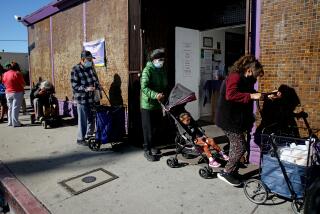Health Woes Keep Poor Women Off Job Rolls
- Share via
A study of nearly 4,000 poor women in Los Angeles and three other big cities shows that welfare recipients suffer more severely than previously thought from multiple health problems that make it difficult for them to get and hold jobs.
The findings released today by the nonprofit Manpower Demonstration Research Corp., a New York-based social research group, point to serious barriers for women under pressure from welfare reform to become self-sufficient and those employed in low-wage jobs struggling to maintain a foothold in the labor market.
It also raises the question of whether many of those women are employable at all, an especially worrisome issue because they face federal time limits on welfare payments.
“Some of the barriers of welfare recipients--such as having chronic health problems or several children with illnesses--may be too intractable to remedy to the point where the women could become totally self-sufficient,” it stated.
The survey is based on interviews conducted in 1998 and 1999 with women in Los Angeles, Cleveland, Miami and Philadelphia who had been on welfare within the previous three years and lived in poor neighborhoods.
Those low-income women and their children suffer substantially higher rates of hunger, homelessness, depression, obesity, addictions, physical abuse and such conditions as asthma and lead exposure than the general population, according to the study.
Women who leave welfare and find work are in much better physical and mental health but often lack health insurance and still experience many problems, according to the study.
Whether working or on welfare, the women surveyed had rates of health problems substantially higher than women of all income levels nationwide. Twenty-five percent described themselves as being in fair or poor health compared with 8% of women nationally.
The children of these women also were in poorer health than their peers: 8% of those who were preschool age were in fair or poor health compared to 3% nationally.
There were some variations among the four cities surveyed. A higher percentage of poor women in Los Angeles--56% of them--said they struggled to provide enough food for their families. And more of Los Angeles’ poor--70%--reported being moderately to severely overweight than in the other communities.
But there was little difference among the cities in other health indicators. Among those surveyed, more than half were at risk of clinical depression, for example. The high levels of stress and depression may reflect the material hardships they face. In-depth interviews with a sample of the women also found many whose children suffer from serious illnesses such as cancer, heart ailments, seizures, HIV infection and mental retardation.
The study’s findings have serious implications for Los Angeles County, which has more people on welfare--622,000--than any other county in the nation. Technically, those receiving aid qualify for Medi-Cal, the state’s subsidized health care program. But health advocates say many have a hard time accessing that care. In addition, it is estimated that more than one-third of the county’s 9 million residents lack any health insurance coverage.
“A Medi-Cal card is not always equal access to health care,” said Susan Fleischman, medical director of the Venice Family Clinic, which provides free medical care to the poor. About 20% of the clinic’s patients have Medi-Cal coverage but use the clinic, added Fleischman. “There is a real dearth of access to specialty care, like orthopedic care and ear, nose and throat specialists, especially for children on Medi-Cal.”
Fleischman said many poor women with children suffer from ailments such as high blood pressure, diabetes and heart disease that would normally be associated with older people.
Tending to their own and their children’s ailments can have a devastating impact.
“You’re up with them all night and end up fatigued,” she said. “A lot of women in low-wage jobs don’t have sick leave so if they take a day off it’s a day of lost wages and a threat to their job security.”
The study noted that all four counties in which surveys were conducted have taken steps to provide health care insurance for women who leave welfare for work. California has a transitional program that generally ensures continued health coverage for families after they stop receiving cash aid if they meet certain requirements.
Los Angeles County officials said they have undertaken a campaign to get word to those leaving welfare that they are still eligible for subsidized medical care.
More problematic, said the report, is developing strategies for women still on welfare.
“More information is needed to determine how to help poor women with multiple health problems meet the mandates of welfare reform and find other ways to support themselves and their families,” said John M. Martinez, a co-author of the report.







